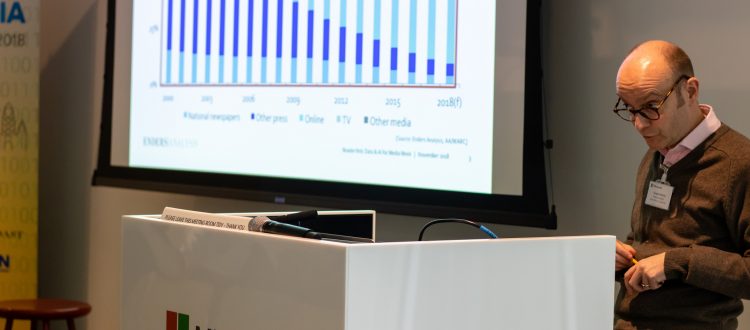Publishers shifting to a reader-centered model
By Joanne Kuai, City University graduate student
Large and small, high end and popular, global and local – publishers around the world expressed more common themes than diverse ones. And every publisher described a shift to a more reader-centered model.
These are some findings of some research with a wide range of publishers from the UK, Europe and the US, shared by Douglas McCabe, CEO of Enders Analysis. McCabe was one of the speakers of the 8thData & AI for Media Conference in London November 1 to 2.
“Fake news is the obvious reason from the demand side, and the nature and trends of the advertising sector are the critical one from the supply side,” says McCabe on reasons of the shift to the reader-first model.
Enders Analysis, an independent research house, recently published “News Brands and Readers Subscriptions,” which studies a variety of publisher digital subscription strategies, challenges, paywall and functionality components, and opportunities for the future.
Data challenges
For publishers, particularly in the UK, there are data challenges relating to their long-term focus on audience reach, says McCabe. He states that for most media, the value of data leaks to third parties, its collection and processing is harder to justify to users, and in advertising, it benefits the buyer rather than the seller of media.
“Only media with loyal audiences, quality products or valuable content are able to convince large numbers of consumers to log on on all their primary devices, only then will media businesses generate deterministic data and move away from educated guesswork, the values of which is spiraling downwards.”
However, McCabe also shares some good news from the findings of their research. He says that the trust in media is rising after years of decline and propensity to pay for news has risen rapidly. He adds that contrary to assumptions, young people are more inclined to pay for news services than older consumers, as they are “the generation who gets it”.

Quality journalism
As a reader-first business with 160 subscribers in its network, Enders Analysis shares much in common with news media. While entirely independently owned, Enders Analysis does not shy away but admits it has its agenda and “doesn’t apologise for it”.
“We see the importance of sustaining plural, independent, quality journalism. We see the increasing importance of managing capital and investment astutely, and of avoiding bad investment decisions. And we see the importance of all media – from micro businesses to corporate empires, and their investors – to address the realities of the world they trade in,” says McCabe.
He adds that they believe that we are living in an age that reasserts the primacy of the editor, “the person that sifts and selects and curates, and so creates a unique service”. “We suffer from information overload, and the need for a trusted voice is more critical than ever,” says McCabe at the 8thData & AI for Media Conference.
The Data & AI for Media Conference is for media and data practitioners who are seeking to earn revenue and expand audiences by leveraging data and artificial intelligence. The 2-day event features a powerful format of general sessions with top-notch speakers, plus interactive, small-group breakout sessions called “huddles.”


